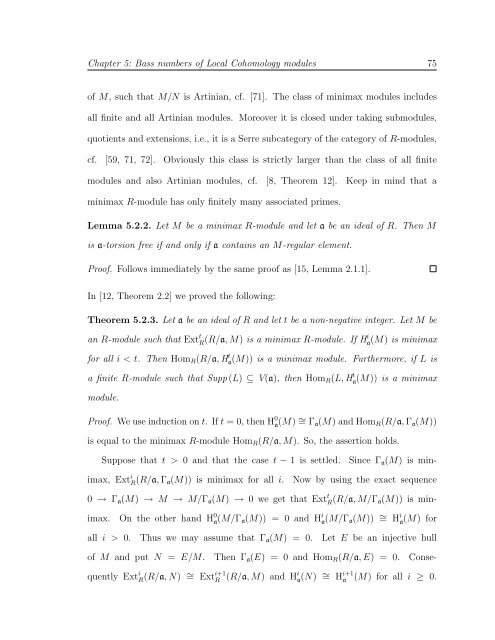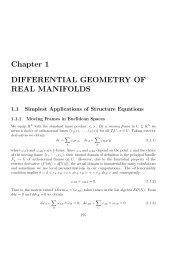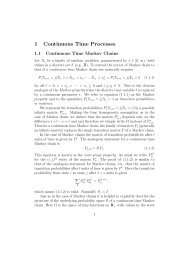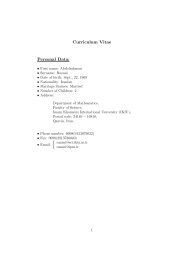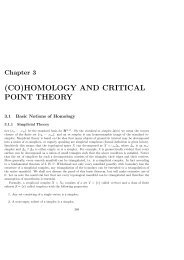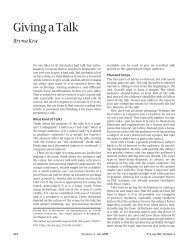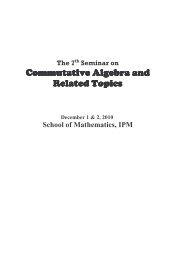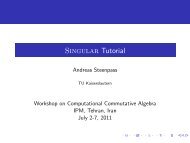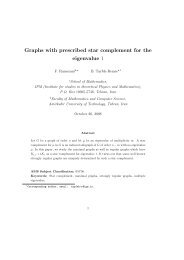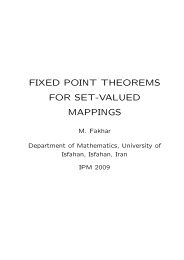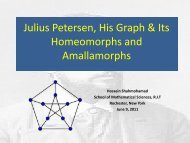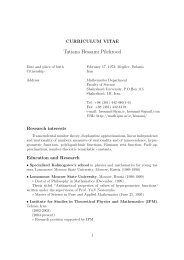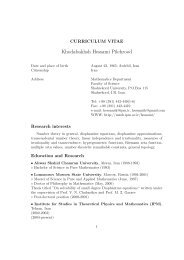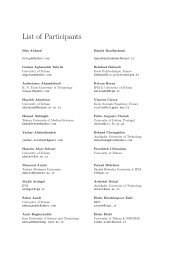Betti numbers of modules over Noetherian rings with ... - IPM
Betti numbers of modules over Noetherian rings with ... - IPM
Betti numbers of modules over Noetherian rings with ... - IPM
You also want an ePaper? Increase the reach of your titles
YUMPU automatically turns print PDFs into web optimized ePapers that Google loves.
Chapter 5: Bass <strong>numbers</strong> <strong>of</strong> Local Cohomology <strong>modules</strong> 75<br />
<strong>of</strong> M, such that M/N is Artinian, cf. [71]. The class <strong>of</strong> minimax <strong>modules</strong> includes<br />
all finite and all Artinian <strong>modules</strong>. More<strong>over</strong> it is closed under taking sub<strong>modules</strong>,<br />
quotients and extensions, i.e., it is a Serre subcategory <strong>of</strong> the category <strong>of</strong> R-<strong>modules</strong>,<br />
cf. [59, 71, 72]. Obviously this class is strictly larger than the class <strong>of</strong> all finite<br />
<strong>modules</strong> and also Artinian <strong>modules</strong>, cf. [8, Theorem 12]. Keep in mind that a<br />
minimax R-module has only finitely many associated primes.<br />
Lemma 5.2.2. Let M be a minimax R-module and let a be an ideal <strong>of</strong> R. Then M<br />
is a-torsion free if and only if a contains an M-regular element.<br />
Pro<strong>of</strong>. Follows immediately by the same pro<strong>of</strong> as [15, Lemma 2.1.1].<br />
In [12, Theorem 2.2] we proved the following:<br />
Theorem 5.2.3. Let a be an ideal <strong>of</strong> R and let t be a non-negative integer. Let M be<br />
an R-module such that Ext t<br />
R(R/a, M) is a minimax R-module. If H i<br />
a(M) is minimax<br />
for all i < t. Then HomR(R/a, H t a(M)) is a minimax module. Furthermore, if L is<br />
a finite R-module such that Supp (L) ⊆ V(a), then HomR(L, H t a(M)) is a minimax<br />
module.<br />
Pro<strong>of</strong>. We use induction on t. If t = 0, then H 0 a(M) ∼ = Γa(M) and HomR(R/a, Γa(M))<br />
is equal to the minimax R-module HomR(R/a, M). So, the assertion holds.<br />
Suppose that t > 0 and that the case t − 1 is settled. Since Γa(M) is min-<br />
imax, Ext i R(R/a, Γa(M)) is minimax for all i. Now by using the exact sequence<br />
0 → Γa(M) → M → M/Γa(M) → 0 we get that Ext t R(R/a, M/Γa(M)) is min-<br />
imax. On the other hand H 0 a(M/Γa(M)) = 0 and H i a(M/Γa(M)) ∼ = H i a(M) for<br />
all i > 0. Thus we may assume that Γa(M) = 0. Let E be an injective hull<br />
<strong>of</strong> M and put N = E/M. Then Γa(E) = 0 and HomR(R/a, E) = 0. Conse-<br />
quently Ext i<br />
R(R/a, N) ∼ = Ext i+1<br />
R<br />
(R/a, M) and Hi<br />
a(N) ∼ = H i+1<br />
a (M) for all i ≥ 0.


